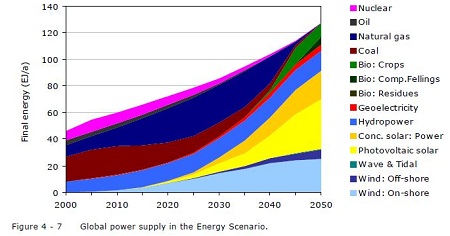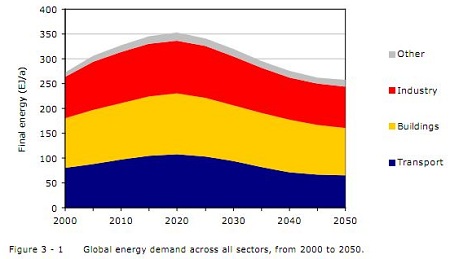Saying it had deliberately “avoided making extravagant assumptions about the benefits of technologies yet to come,” the conservation organization WWF released a report describing a scenario under which the globe’s energy needs would be met almost entirely by renewable sources by 2050.
Oddly, the report is titled “100% Renewable Energy By 2050,” yet the text itself lays out a scenario under which a small portion of worldwide energy needs are still met by non-renewables. “Stabilizing energy demand driven by strong energy efficiency coincides with fast renewable energy supply growth in the later years, resulting in an energy system that is 95 percent sustainably sourced,” the report reads.

Slowing the growth in energy demand – and then actually dialing demand down – is perhaps the most striking aspect of the WWF report, prepared by the energy consultancy Ecofys. Despite a rising population, growing economies and increases in travel, under the Ecofys scenario energy demand in 2050 will fall 15 percent from the 2005 level.
How so? Big lifestyle changes, for one thing. The food-production sector in particular must be remade: The report calls on well-off people to reduce meat consumption by half, and it envisions whittling down food transportation distances. Transportation itself gets a makeover, too, with the report basing its projections in part on gains in efficiency and electrification, but also on personal actions such as people “walking or cycling short distances, taking buses, and taking the train instead of flying.”

From the WWF’s perspective, getting to an all-sustainable future – with wind and solar playing the biggest roles – is partly a matter of equity. It sees big energy users like the United States using far, far less power, while electricity comes to 1.4 billion people who currently don’t have it. Mostly, though, the report’s urgency is inspired by the threat of fossil-fuel fed global warming – a threat the authors say their scenario will largely mitigate, as “CO2 emissions from the world’s energy supply sector (are) reduced by over 80 per cent by 2050 – providing a high level of confidence that the average global temperature rise will be limited to the less than the two degrees Celsius threshold identified as presenting unacceptable risks of catastrophic climate change.”
As for nuclear power, the WWF report does away with it entirely by 2050, calling it unsafe and too expensive.